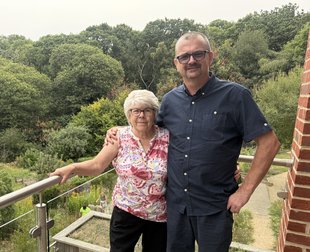Change a life through friendship, connection and community
Have you heard about Compassionate Neighbours? It’s a programme that introduces trained volunteers with people in their local area who have become isolated or lonely, who are nearing end of life due to age or illness.
Join our network of Compassionate Neighbours
The programme was started over ten years ago at St Joseph’s Hospice in East London: here at the Community Hospice our compassionate neighbours programme has been running since 2018.
We’ve trained hundreds of volunteers, many of whom have gone on to become compassionate neighbours, visiting people in their community.
We want to train more volunteers in the boroughs of Greenwich and Bexley, so that we can reach more people who need the support that the Compassionate Neighbours programme brings. If you want to change the life of someone in your community, please see the role description and complete the application form.
How does it work?
If you're 18 or over and a Greenwich or Bexley resident, you can train to become a compassionate neighbour. Contact us to come along to one of our upcoming training dates, and find out more.
Training dates
The one day training takes place at our main Community Hospice site. Our next couple of training dates are:
- 17 March
- 16 April
We welcome people of all walks of life. All we ask is that volunteers can spare one hour a week to touch the life of someone who can benefit from the support and some social interaction. Once trained, our volunteers are matched with someone in their local area – often within walking distance. Matches are typically based on where you live, shared hobbies and interests, or backgrounds. When a match is made, we’ll make the introductions and from then the new friendship can blossom. We’re not prescriptive, so our matches decide how to spend their time together.

John, Compassionate Neighbour“WHEN YOU SAY VOLUNTEERING, PEOPLE THINK IT’S WORK; BUT FRIENDSHIPS BLOSSOM. SANDIE’S BEEN A BIG SUPPORT FOR ME TOO. IT’S A TWO-WAY THING.”
Not all matches are hospice patients. As a result of the training, some people feel empowered to go on to find their own matches. It might be they have a neighbour down the road who they know is older and lives alone, for example. And the training gives them the confidence to reach out to them and a structure to know how they might go about it. This helps us to make sure that our services reach even further into the community - to those who might not need our services now but might in the future.
Jon said “In the time we’ve been delivering the training, we’ve seen examples of the programme taking on a life of its own with offshoot support groups forming, and with compassionate neighbours becoming true friends with the people we introduce them to.
We believe that everyone who is dying should have a friend. We want to see the programme grow because there so many more people who would benefit if support was offered to them.
Jon adds “Care and support is about more than just symptom management – and in many cases, it can change people’s lives. It can give them something to look forward to and re-engage them in the things that were important to them but have been difficult to keep going.”
Why volunteer?
- Form genuine connections
- Join a caring volunteer community
- Receive free training and ongoing support
- Enjoy discounts in our charity shops
"Care and support is about more than just symptom management – and in many cases, it can change people’s lives"